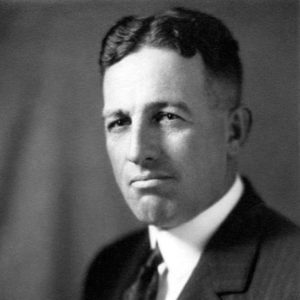calsfoundation@cals.org
William Judson Holloway (1888–1970)
William Judson Holloway was an Arkansas-born politician and lawyer who moved to Oklahoma, where he became active in politics. He led the state of Oklahoma as governor in the early years of the Great Depression.
William Judson Holloway was born on December 15, 1888, in Arkadelphia (Clark County) to Stephen Lee Holloway and Molly Holloway. Holloway’s father was a Baptist minister, and he sent his son to Ouachita College (now Ouachita Baptist University). After graduating in 1910, he studied at the University of Chicago.
Holloway settled in Hugo, Oklahoma, and while reading the law, he also served for three years as principal of Hugo High School. He entered Cumberland University Law School to complete his legal training, earning his degree in 1914. On June 16, 1917, he married Hugo school teacher Amy Arnold; they had a son, William J. Holloway Jr., who became a federal judge.
Holloway started a practice in Hugo. He was soon elected Choctaw County attorney, a post he held from 1916 to 1918. From there, he moved to the state legislature. A Democrat, he served in the state Senate from 1920 to 1926, ultimately becoming Senate president pro tempore. As a legislator, he was known for his support of education and educational reform.
In 1926, Holloway became lieutenant governor of Oklahoma. On January 21, 1929, he became acting governor when impeachment proceedings were brought against Governor Henry Johnson. When Johnson was finally removed, Holloway became governor on March 20, 1929. Holloway assumed office at a critical time. After the turbulence that marked his predecessor’s term, Holloway asked for “an era of goodwill,” and he worked hard to improve the state’s image. He had barely settled into office when the Great Depression began.
In the early days of the Depression, he oversaw the imposition of major budget cuts necessitated by falling state revenues. While his tenure in office was the bridge between the booming 1920s and the Depression-era 1930s, he did secure the passage of legislation that redefined the limits on child labor, as well as new laws aimed at improving health and working conditions for miners. A personal advocate of moderation in regards to alcohol, he initiated an annual statewide Temperance Day. In addition, Holloway pushed for legislation aimed at improving the state’s highway commission as well as the elimination of toll bridges and roads. He also implemented a 45 mile-per-hour speed limit and oversaw changes in election laws that included the introduction of a run-off primary.
With Oklahoma mired in the Great Depression and the state’s agricultural fortunes literally blowing away in the Dust Bowl, Holloway’s future political prospects were not particularly strong. Another term was also impossible because he was prohibited by state law from succeeding himself in 1930.
Never again seeking elective office, Holloway instead relocated to Oklahoma City, where he established a successful private law practice. He represented Oklahoma on the Interstate Oil Compact Commission under three governors. His post-gubernatorial years were mostly spent tending to his law practice in Oklahoma City, where he lived until his death on January 28, 1970. Holloway is buried in Rose Hill Cemetery in Oklahoma City.
For additional information:
“William Judson Holloway.” Encyclopedia of Oklahoma History and Culture. http://www.okhistory.org/publications/enc/entry.php?entry=HO017 (accessed September 9, 2021).
William H. Pruden III
Ravenscroft School
 Early Twentieth Century, 1901 through 1940
Early Twentieth Century, 1901 through 1940 Politics and Government
Politics and Government W. J. Holloway
W. J. Holloway 




Comments
No comments on this entry yet.